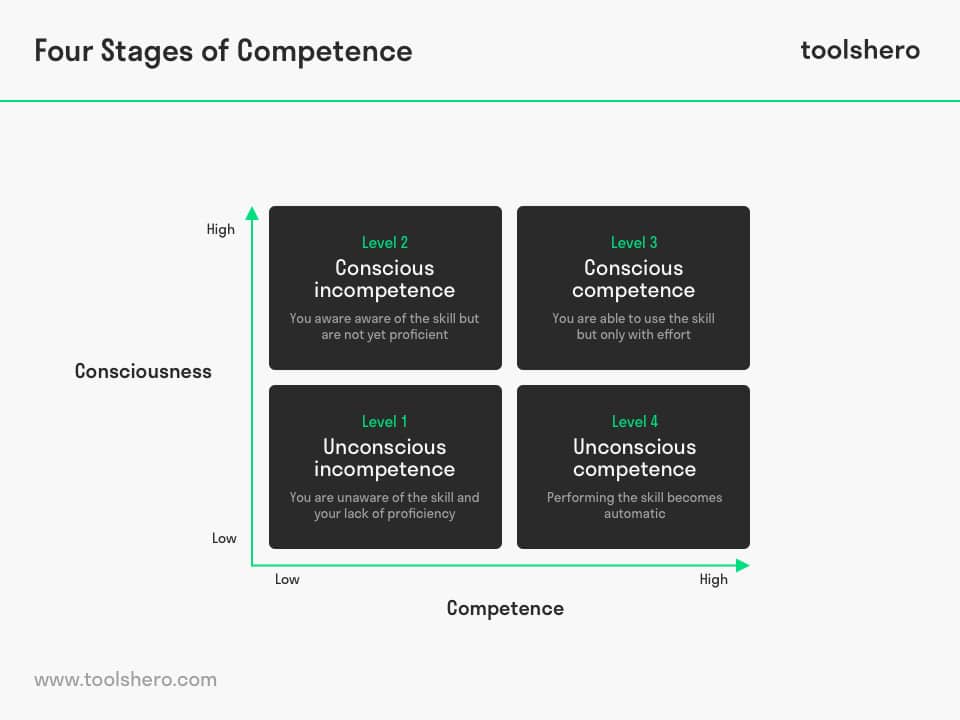Four Stages of Competence

Four Stages of Competence: this article provides a practical explanation of the four stages of competence. After reading, you’ll understand the basics of this powerful personal development tool.
What are the four stages of competence?
The four stages of competence are part of a learning model of the psychological states of individuals going through the progression from incompetence to competence for a certain skill.
The four phases show that individuals don’t know in advance how little they know or are capable of when it comes to a certain skill; they don’t know their own incompetence. When they actually recognise their own incompetence, they start acquiring a skill and consciously using it. Eventually the individual will learn to use the skill without even having to think about it: the individual will have reached unconscious competence.
When they understand this model, coaches and trainers can learn to better recognise the learning needs of their students and develop learning objectives based on where they are in the learning curve.
The model is also known as the ‘conscious competence learning model’, ‘conscious competence matrix’, ‘learning matrix’, and ‘conscious competence ladder’.
Who developed the four stages of competence?
The theory behind the four stages of competence was initially founded by Martin M. Broadwell back in 1969. Later in the 1970’s, Noel Burch from Gordon Training International developed this theory further, known as “the four phases for learning new skills”. Abraham Maslow is often erroneously credited with this work. The four stages of competence don’t appear in Maslow’s major works.
The four stages of competence explained
We will now explain the four stages of competence using a practical example.
Level 1: What does unconscious incompetence mean?
Before an individual carries out an activity that is new to them, that person doesn’t actually know what they’re doing. At this stage, the person lacks the knowledge, skills, and capability to carry out a particular task correctly.
This stage of unconscious incompetence can last for years. In order to start learning a new skill, it’s important that the person in question recognises their inability to properly carry out a certain skill. Only then can they progress to a higher level of competence.
Unconscious incompetence example
A secondary school student starts his first day as a shelf stacker at a supermarket. The manager asks him to fill the milk bottles in the dairy section. The student walks into the storage room, takes the milk to the shelf, and starts stacking. He’s never heard of rules like First In First Out (FIFO), meaning the new milk has to be placed at the back of the shelf, so the old milk gets sold first. Yet the student just stacks the shelf his way; he doesn’t he’s not doing it right.
The manager then tells him he didn’t stack the milk correctly. Recognising this mistake clears the way to the second of the four stages of competence, conscious competence.
Level 2: What does conscious incompetence mean?
The second of the four stages of competence is that of conscious incompetence. This phase starts when awareness is developed of the things a person does not yet know or is not yet able to do. To many people, stage 2 is the most uncomfortable stage, since they have to recognise that they have not yet mastered a certain skill or that they’re not carrying out a certain activity properly. This can lead to feelings of embarrassment and acknowledging shortcomings.
However, it’s important to recognise this incompetence. That way one can train and eventually achieve a higher level of competence. As was the case with stage 1, people can get stuck in the stage of conscious incompetence for a long time. How long exactly depends on their motivation to learn, as well as acknowledging and accepting the shortcomings/incompetence.
The most important characteristic of this stage is the required ability to identify keys to competence. These keys are other, more capable people one can learn from.
Conscious incompetence example
After the new employee was told about the mistake he made on his first day, he notices that there are other things he can’t do properly yet, simply because he lacks the required knowledge and experience. But he wants to learn, and he will do his best to quickly acquire the necessary skills. In order to do so, he’s assigned to an experienced coach to work with. If he has any questions or isn’t sure, this coach will help him and teach him everything he needs to know. Being assertive is an important part of this.
Level 3: What does conscious competence mean?
This is the stage where you truly start to learn. Conscious competence is the stage at which people actively work to improve a certain skill, but are still quite new at it. This period is marked by trying things, failing, trying again, and getting better. Slowly but surely competence will grow, but there’s still a long way to go before this new skill will become routine. The key for this stage is to persevere and not give up.
Conscious competence example
In addition to the example, stage 3 for the new employee starts when he actively starts developing new skills and acquiring new knowledge. For the employee this means receiving training about his work in the supermarket. As time progresses, the new employee will learn all the required information. This continues until he can only improve his competences in practice through repetition.
Level 4: What does unconscious competence mean?
As the employee continues to work and learn, he will reach the stage of unconscious competence. During this stage, he no longer has to think about the activities he’s skilled at. Unlike with the earlier stages in the process, the progression to unconscious competence doesn’t take long. Repetition of activities will ensure it happens quickly. As an unconsciously competent person, it feels good doing what you do, so you keep doing it.
Unconscious competence example
For the supermarket employee, unconscious competence means that he’s finally at the top of his game in terms of skills and competence. Thanks to dedication to learning and perfecting his work, he can finally carry out the various tasks in the supermarket without even thinking about them. Because he no longer has to question his actions when carrying out these activities, it feels good, and he keeps doing them.
To summarise the four stages of competence
The four stages of competence, also called the four stages of learning, are part of a model based on the principle that people, before they start learning something, don’t know how much they know and what they know. As they learn new skills, they go through four different stages, eventually leading to unconscious competence.
When coaches and trainers understand this model, they will be better able to identify the needs of their students when it comes to specific learning objectives. The four stages of competence can be summarised as follows:
Level 1: unconsciously incompetent
‘I don’t know what I don’t know’
Level 2: consciously incompetent
‘I know what I don’t know’
Level 3: consciously competent
‘I grow and improve and that slowly shows’
Level 4: unconsciously competent
‘I go with the flow thanks to my level of knowledge’
Now it’s your turn
What do you think? Do you recognise this explanation of the four stages of competence? Would you like to share an example of you learning new competencies? Was your learning process similar to the one described here? What else is important when learning new skills? Do you have any tips or additional comments?
Share your experience and knowledge in the comments box below.
More information
- Broadwell, M. M. (1969). Teaching for learning (XVI). wordsfitlyspoken.org. The Gospel Guardian. Retrieved 11 May 2018.
- Burch, N. (1970). Conscious Competence Learning Model: Four stages of learning theory-unconscious incompetence to unconscious competence matrix-and other theories and models for learning and change. Acedido em https://www. citehr. com/23983-conscious-competence-learning-model. html, 8.
- Burch, N. (2014). Four Stages for Learning Any New Skill or Four Stages of Competence were developed by Burch while working at Gordon Training International in the 1970s.
- Lynch, D. (2017). Self Evaluation: Building Student Self-awareness and Competence. Proceedings of the Canadian Engineering Education Association (CEEA).
How to cite this article:
Janse, B. (2020). Four Stages of Competence. Retrieved [insert date] from Toolshero: https://www.toolshero.com/personal-development/four-stages-of-competence/
Add a link to this page on your website:
<a href=”https://www.toolshero.com/personal-development/four-stages-of-competence/”>Toolshero: Four Stages of Competence</a>
Published on: 03/02/2020 | Last update: 08/03/2022













